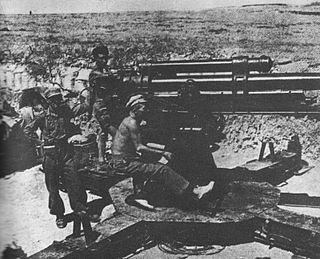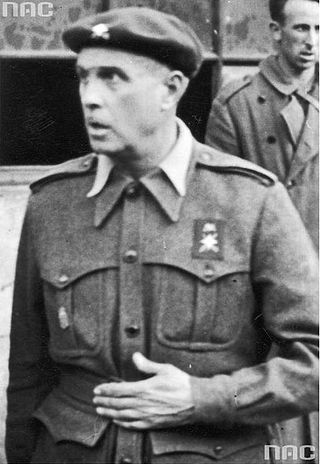
The Battle of the Ebro was the longest and largest battle of the Spanish Civil War and the greatest, in terms of manpower, logistics and material ever fought on Spanish soil. It took place between July and November 1938, with fighting mainly concentrated in two areas on the lower course of the Ebro River, the Terra Alta comarca of Catalonia, and the Auts area close to Fayón (Faió) in the lower Matarranya, Eastern Lower Aragon. These sparsely populated areas saw the largest array of armies in the war. The battle was disastrous for the Second Spanish Republic, with tens of thousands left dead or wounded and little effect on the advance of the Nationalists.

Enrique Líster Forján was a Spanish communist politician and military officer.

The Battle of Teruel was fought in and around the city of Teruel during the Spanish Civil War between December 1937 and February 1938, during the worst Spanish winter in 20 years. The battle was one of the bloodiest actions of the war, with the city changing hands several times by first falling to the Republicans and eventually being retaken by the Nationalists. In the course of the fighting, Teruel was subjected to heavy artillery and aerial bombardment. In the two-month battle, both factions together took 110,000 casualties.
Sebastián Pozas Perea was a Spanish military officer and civil servant.
Juan Hernández Saravia was a high-ranking Spanish military officer of the Republican government forces during the Spanish Civil War.

José Solchaga Zala was a Spanish general who fought for the Nationalists in the Spanish Civil War.

Antonio Cordón García. was a Spanish soldier, born in Sevilla, who commanded during the Spanish Civil War.
The Battle of Alfambra took place near Alfambra from 5 to 8 February 1938, during the Spanish Civil War, and was a part of the Battle of Teruel. After the conquest of Teruel by the Republican army, the Nationalists started a counteroffensive in order to reocuppy Teruel. On 5 February, a huge Nationalist force broke the republican lines north of Teruel towards the Alfambra River, took 7,000 republican prisoners and threatened the Republican forces in Teruel.
The Battle of Caspe took place during the Aragon Offensive of the Spanish Civil War in 16–17 March 1938.

The Cartagena uprising took place 4–7 March 1939 during the Spanish Civil War. The troop transport SS Castillo de Olite was sunk during the revolt.

The final offensive of the Spanish Civil War took place between 26 March and 1 April 1939, towards the end of the Spanish Civil War. On 5 March 1939, the Republican Army, led by Colonel Segismundo Casado and the politician Julián Besteiro, rose against the socialist prime minister Juan Negrín, and formed a military junta, the National Defence Council to negotiate a peace deal. Negrín fled to France but the communist troops around Madrid rose against the junta, starting a civil war within the civil war. Casado defeated them and started peace negotiations with the Nationalists. Francisco Franco, however, was willing to accept only an unconditional surrender. On 26 March, the Nationalists started a general offensive and by 31 March, they controlled all of Spanish territory. Hundreds of thousands of Republicans were arrested and interned in concentration camps.
Manuel Matallana Gómez was a Spanish officer and lawyer. A son of a military officer, he joined the Spanish army and participated in the Rif War. He supported the Republican government during the Spanish Civil War. In November 1936 he was a member of the general Miaja’s staff during the battle of Madrid. After that, he was promoted to colonel and in July 1937 he was the chief of staff of Miaja during the battle of Brunete, and then later promoted again to general. In February 1939 he said to the prime minister Negrin that it was impossible to continue the war and in March 1939 he joined Casado's coup against the Negrin government. After the end of the war, he was detained and jailed by the Nationalists. Convicted to 30 years imprisonment, Franco granted him a reduced sentence, and by 1941 Matallana was a free man. He died in Madrid in 1952.
José Asensio Torrado (1892–1961) was a Spanish general.
Luis Barceló Jover was a Spanish military officer.
Antonio Escobar Huerta was a Spanish military officer.
Adolfo Prada Vaquero (1883–1962) was a military officer of the Spanish Army. He remained loyal to the Republican government during the Spanish Civil War.
Francisco Galán Rodríguez (1902–1971), was a Spanish military officer.
Domingo Moriones Larraga (1883–1964) was a Spanish military officer. Moriones was a professional officer of the Spanish Army. In 1934 he was the military governor in Gijon and took part in the suppression of the 1934 rising there. In July 1936, he remained loyal to the Republic. At the beginning of 1937 he led the 2nd Division in the Somosierra front. He later was appointed commander of the I Army Corps of the Army of the Centre, and in July 1937, he led the republican forces in the failed Segovia Offensive. In 1938, he was the commander of the Republican Andalusia Army. In February 1939, he was one of the military officers who said to the prime minister Juan Negrin that a further military resistance was useless and in March 1939 he supported Casado's coup.
Manuel Tagüeña Lacorte (1913–1971) was a Spanish military officer of the Spanish Republican Army.

Camilo Alonso Vega was a Spanish military officer and minister.







